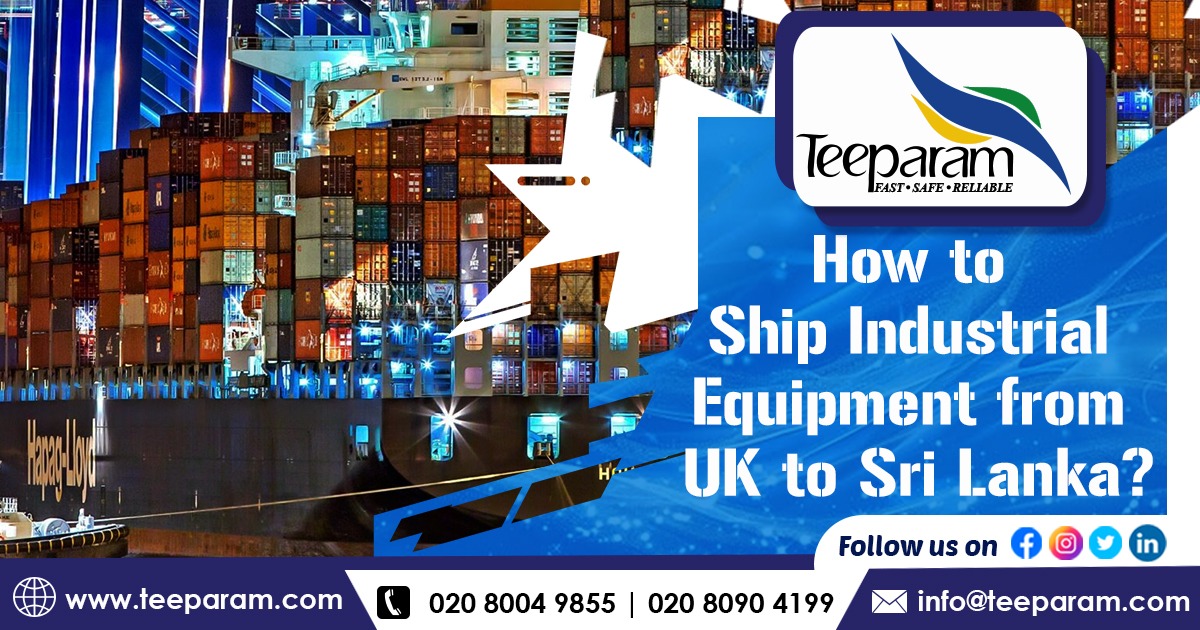Are you planning to ship some industrial equipment to Sri Lanka? If you are planning to start a new venture in Sri Lanka or expand your industrial equipment business overseas, it is no small task. It is a process that requires careful planning, specialist handling, and the right shipping partner to send packages from UK to Sri Lanka. For a smooth and cost-effective delivery, everything matters, from selecting the right transport method to protecting your cargo against the elements.
Let’s examine every step involved in shipping industrial equipment from the UK to Sri Lanka.
1. Select the Right Shipping Method
There are two common shipping options for transporting large industrial equipment overseas.Roll-on/Roll-off (Ro-Ro) or container shipping.
- Roll-on/Roll-off (Ro-Ro)
This option allows driveable machinery to be rolled onto the vessel and secured for transport. It is often more affordable, but it is suitable only for equipment with wheels or tracks that can move independently. - Container Shipping
For non-driveable equipment or machinery that requires additional protection, container shipping is often the better choice. Options include:- Standard closed containers for smaller equipment.
- Open-top containers for items that are too tall for standard containers.
- Flat-rack containers for oversized or irregularly shaped machinery.
An experienced shipping company can help you determine which method best suits your equipment, taking into account its size, weight, and mobility.
2. Loading the Machinery
This is the most critical stage of the process. You may require specialized loading equipment, such as forklifts, cranes, or tow trucks, to do the job. But if your equipment is drivable, you can load it straightaway to the vessel or into a container by using a ramp. If not, you may need lifting equipment. Some ports offer loading services; otherwise, you can arrange it through your shipping agent.
It is important to check whether the equipment is well-balanced and positioned when loading to avoid any movement during transit, which may result in damage.
3. Suitable Packaging
You may use a container, Ro-Ro, or flat rack for your equipment, but make sure to secure it to prevent damage during the journey. When a container is not fully loaded, items can move and cause dents, scratches, or more serious damage.
Below are a few ways to secure your equipment:
- Filling empty spaces with timber blocks or padding.
- Use heavy-duty straps and chains to lock the equipment in place.
- Consider professional packing services, especially for high-value machinery.
If you need to protect your shipment professionally, some companies offer pre-shipment preparation at warehouses near the port.
4. Protecting Against Weather and Salt Exposure
Sea cargo can be exposed to harsh marine conditions, salt spray, moisture, and humidity. In general, industrial machinery is built to withstand outdoor environments. However, sensitive parts such as electronics or control panels may require extra protection.
Here are some methods to avoid such damage.
- Shrink wrapping – this will act as a shield to the entire machine, protecting it from salt water and dust.
- Using desiccants inside the wrapping to absorb moisture.
- Applying protective coatings to exposed metal parts to prevent corrosion.
5. Cost Cutting
Shipping industrial equipment from UK to Sri Lanka, especially the extra-large and heavy ones, can be very costly. Here are ways to reduce costs:
- Disassemble the equipment if possible. Removing attachments or accessories may allow the main components to fit into standard containers.
- Maximise container space by packing efficiently. A fully loaded container means fewer containers are needed.
- Plan for sea transport over road transport whenever possible, because sea freight rates are usually lower.
- Book in advance to take advantage of lower rates and better scheduling options.
6. Documentation and Compliance
Ensure that you meet the regulations of both the UK and Sri Lanka. Check that your equipment matches local safety and import standards.
Key points to consider:
- For certain types of machinery, compliance certification may be required.
- Required documents might include proof of ownership, purchase invoices, and export/import declarations.
- Customs clearance in Sri Lanka requires proper product classification and valuation.
7. Customs Duties and Tariffs
Remember, customs duties and import tariffs can affect the total cost of shipping your equipment. These costs can depend on:
- The type of equipment.
- The value of the shipment.
- The specific import regulations in Sri Lanka.
Do your research on these fees ahead so that you can budget accordingly. Shipping companies may not set these charges, but they can guide you or connect you with customs brokers who can help.
8. Careful Timing
Shipping schedules often vary when it comes to international shipping. Delays can occur due to port congestion, weather, or customs inspections. If your equipment has a specific date to arrive in Sri Lanka, plan well ahead.
A few tips for timing your shipment:
- Book a few months in advance for more predictable delivery windows.
- Avoid peak shipping seasons to avoid high rates and delays.
- To reduce the cost, try shipping multiple pieces of equipment together for potential cost discounts.
9. Insurance
Industrial equipment is costly, so insurance is essential. Even though shipping companies carry some liability, it may not cover the full value of your equipment — especially in cases of theft, severe damage, or loss at sea.
Consider the following when selecting insurance:
- Pick a comprehensive coverage that reflects the true value of your cargo.
- Compare quotes from multiple insurers.
- Ask your shipping company if they can recommend reliable insurance providers.
10. Select a Reliable Shipping Partner
Selecting a well-experienced and trusted shipping partner is important for the successful delivery of your equipment. A reliable partner will:
- Understand the challenges of moving heavy and oversized loads.
- Provide professional packing and securing services.
- Handle customs clearance efficiently.
- Maintain strong relationships with overseas agents in Sri Lanka to ensure smooth delivery.
The complexity of shipping industrial equipment from the UK to Sri Lanka can be reduced with the right shipping method, proper securing and protection, and compliance with all regulations. A well-experienced shipping partner can ensure accurate measurements and documentation, avoid unnecessary costs, delays, and damage to your valuable equipment.
From selecting between Ro-Ro and container shipping to protecting against the elements and securing full insurance coverage, every detail is equally important. Obtaining the right approach and expert assistance can ensure that your industrial equipment arrives safely and on schedule.



